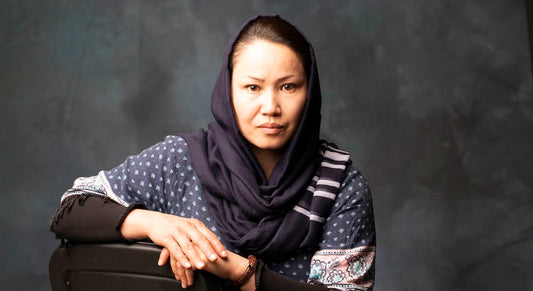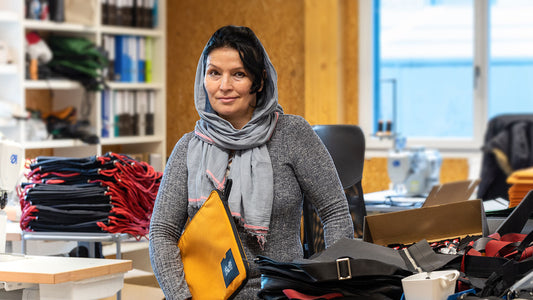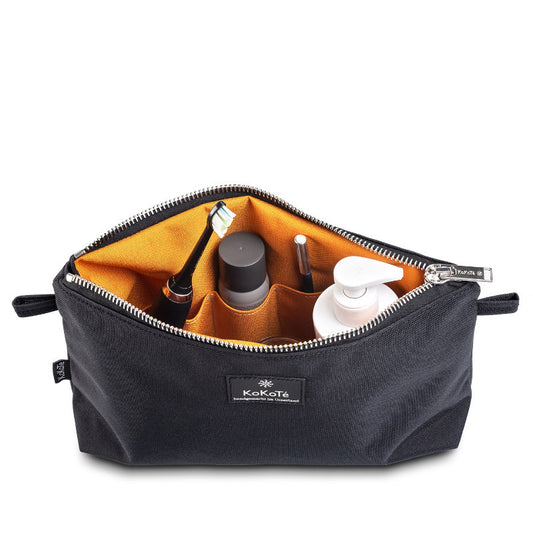«The head becomes light, the head becomes calm»
Report by Senta Walker
You finish sewing the seam, lift the presser foot, pull the fabric out from underneath and cut the threads.
Shukriye Heydari, Amene Nuri and Achinedu Enebeli leave their workplace, their sewing machine, and come to the large wooden table in front of the glass pane to the office. We are in the light-flooded production facility of KoKoté in Schattdorf.
The three women are part of the group of people in Switzerland who are over 25 years old and are doing an apprenticeship. According to the State Secretariat for Education, Research and Innovation (SERI), they are among the 12 percent of apprentices who graduate when they are over 25 years old. The subgroup "women with a refugee background over 40 years old" describes them even better. But this term does not appear in the SERI statistics. Nevertheless, they exist, women like our three aspiring textile practitioners with their stories and training experiences. In this round table, they report on a special education week.
Five days at the Kerenzerberg sports center
Ms. Heidary, Ms. Nuri and Ms. Enebeli are back from the sports week at the Swiss Textile School (STF) in Zurich. They spent five days at the Kerenzer Berg sports center near Filzbach, where the focus was on sports and exercise. What did they experience and learn during this week?
First, Ms. Heidary (from Afghanistan) says that she really enjoyed the sports week. It was very interesting, everyone was nice, she says. She already knew one of the teachers, Mr. Keller. She really appreciated the food, the people, the sports, being with young people and the respectful way they treated each other.
Ms. Enebeli (home country Nigeria) reports on the daily routine: first breakfast, two sports sessions from 8:30 a.m., then lunch, later two more sports lessons until 5 p.m. Dinner at 6 p.m. Good to join in, an interesting program.
What sports were offered? The women searched for words like volleyball, tennis, football, basketball, table tennis, chess and yoga. They showed photos of young people juggling clubs and described a Japanese game of skill whose name, Kendama, we found on the Internet.

intergenerational and cultural exchange
When asked how a middle-aged woman or mother feels when she spends a week with young students at a sports camp, Ms Nuri (from Afghanistan) answers. She has two grown-up sons, so she has her own experience of dealing with young people. She was impressed by the behavior of the young people during the sports week. The word respect comes up again. Young people, teachers, service staff, the cook, everyone was very friendly and helpful. They supported each other. No problems, she says, on the contrary. After nine years, she had been away from her everyday life again. A week without chores at home, at work or in training. It made her head feel light and calm. She liked that.
Ms. Heidary continues the story. At the table, they talked about their origins, ages and families. She has three children herself. Living with the young people was easy. She enjoys being with people, young and old. She was pleased that the young people approached her. She felt accepted in the group. They ate like they did at home. Lots of salad and vegetables, spaghetti, pizza and much more.
Ms. Enebeli also spoke about the sports week with young people whose mother she could be. It wasn't easy for her to approach people. But that had nothing to do with the boys, the course leaders, or the house staff. She is naturally rather shy. It would have been easier for her if she had been in a sports group with the other two women. The fact that this was not the case was a real challenge. Then there was the German language. She understood most of what was said to her. But speaking herself and answering questions? Sometimes she was at a loss for words. That's why it was good that she was able to practice speaking with the young people.
Sport in the Homeland and Sport Today in Switzerland
The conversation continues with the topic of "Sport in their homeland and sport today in Switzerland". The two women from Afghanistan both remember the time when girls and women could do sport in Afghanistan. Cycling and motorcycling were also allowed back then. But since the Taliban took power, a lot has changed. Over the years - even while on the run - they have learned about other ideas and found their own way to live their lives in harmony with their culture. Playing sport has always been part of that.
Ms. Enebeli talks about her youth in Nigeria, where she played soccer in primary school. Singing in church also meant a lot of exercise. Now she cycles almost every day from Erstfeld to work in the Schattdorfer Ried, sometimes also to Schattdorf and to Altdorf train station.
When she gets up in the morning, she does 15 minutes of exercise. Yoga and strength exercises are the order of the day to wake up the body, says Ms. Heidary when asked about the importance of sport in her everyday life. Ms. Nuri admits that she hardly finds time for sport during the week. On Tuesday evenings, she attends a German course with her colleagues at the Uri Vocational and Further Education Center (BWZ URI) in Altdorf. On Thursdays, she travels to the STF in Zurich with Ms. Enebeli and Ms. Heidary. Otherwise, she works during the week here at the KoKoTé factory in Schattdorf, studies, does homework and does the housework. But at the weekend, she has enough time to go jogging.
All tasks and duties remained at home
Our discussion, which is also intended as a language exercise in German, is coming to an end. The women have given an insight into their lives as older learners with a refugee background. They have shown that they can communicate well in a newly learned language and that they fit into our educational and social system without losing their roots.
Mrs. Enebeli is the first to sum up her impressions of the sports week: "Everything was good: the sport - especially playing tennis and volleyball -, the trip, the city, the mountains, the snow. Sleeping with my two colleagues in the three-bed room was also good." "Sometimes" - she searches for the right word and laughs - "we snored, no, snored. But that wasn't so bad."
For Ms Nuri, the days on Kerenzer Berg were a break from everyday life. All tasks and duties stayed at home. Her physical well-being was well taken care of. An unusual, positive state for her. At the centre there was only sport, being with the young people, the here and now and healthy tiredness in the evening. Ms Nuri emphasises again that this was her first longer break in nine years. "Leaving everything at home for a week makes your head light and calm," she repeats. "And then there is the story with the yoga teacher, Ms Meyer. She is young, flexible and eight months pregnant. I tried to imitate all the movements. I stroked my stomach several times, following her example. When she noticed this, she laughed. She said I didn't have to do that, it wasn't part of the yoga exercise. She was just calming down her baby, which was kicking in her stomach. We all laughed so much."
Ms. Heidary concludes the discussion. Her conclusion about the sports week: "Everything went very well, my body needs more exercise and yoga. Then I feel better. - And what happens to the photos we took during the sports week?"
Shortly afterwards, the three women are sitting at their work table in front of their sewing machines again. The work material is clamped under the sewing foot and the machines start to rattle.
New bags are being created, bags that enable women to receive an education and earn a living.
Association Equilibre
Since 2015, the non-profit association Association Equilibre (AE) has been committed to the education and work integration of older people with a refugee background through the KoKoTé project and other measures (mentoring program for refugees, integration pre-apprenticeship, women's empowerment program).
Shukriye Heidary (41), Amene Nuri (47) and Achinedu Enebeli (41) are supported by the AE in their training to become textile practitioners EBA. They work 60% for the bag manufacturer KoKoTé and 40% for their own training. The AE provides them with a specialist teacher, mentors and an education coordinator.








